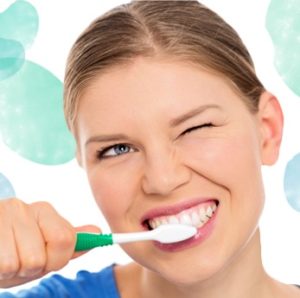We all know (or possibly are) that one person that has bad breath no matter how many mints they eat. Bad breath is very common (affecting roughly 25% of the global population) and can have a significant effect on one’s social life and self-confidence. There are several potential medical and dental causes for halitosis, but on the upside, there are also several treatments and preventative measures that can be taken as well.

Symptoms of Halitosis
Halitosis generally exhibits:
- A white coating on the tongue (especially the back of your tongue);
- A dry mouth;
- Build-up around your teeth;
- Morning bad breath and a burning tongue;
- Thick saliva and a constant need to clear your throat; or
- A constant sour/bitter/metallic taste in your mouth.

Causes and Solutions
1. Diet
Cause: The beginning of the digestion process starts at the mouth, however, foods with strong odours will leave you with bad breath until they are fully digested and passed through your body. Brushing, flossing, and even mouthwash can only temporarily relieve dietary bad breath. Of course, you should brush and floss your teeth after a meal regardless but that is something to keep in mind. Dietary halitosis is generally temporary.
Solution: The easy solution is to eat a different diet. Eat foods and drink drinks that are less odorous, and stay away from garlic, onions, and the like. Alternatively, enjoy your tasty meal, brush and floss your teeth, and just know that the smell will go away in a few hours.

2a. Poor Dental Hygiene
Cause: As is the mantra of all dentists: if you don’t brush and floss your teeth daily, the food caught between your teeth will remain sitting in your mouth. These food particles will break down in your mouth and promote bacterial growth: in between your teeth (causing tooth caries), around and underneath your gums (contributing to periodontal disease), and on your tongue as well. All of this bacterial growth causes bad breath as the bacteria coating your teeth and gums release smelly gases.
Solution: Make sure you brush your teeth twice daily and floss your teeth at least once daily. You can also use a tongue scraper/cleaner. By doing this, you will not only take care of your halitosis but you’ll also prevent dental caries developing in your teeth, prevent periodontal disease, and get a beautiful white smile from it too. If the dental caries or periodontal disease develops to a stage that cannot be treated by mere brushing and flossing, go see your general dentist for the appropriate dental treatment.

2b. Dentures
Cause: If you have dentures but don’t clean them properly, food particles can get trapped in dentures and will also cause halitosis.
Solution: If you have dentures, take care of them and clean them properly to ensure no food gets trapped in them. If you don’t know how to clean your dentures, ask your dentist on the correct technique to clean them.

3. Smoking
Cause: Smoking or chewing tobacco-based products causes bad breath due to several factors:
- Cigarettes leave smoke particles in the throat (and lungs);
- The chemicals in tobacco smoke (aromatic hydrocarbons and other pungent chemicals) remain in the mouth; and
- Smoking continually dries out the mouth, leaving a perfect environment for the promotion of anaerobic oral bacteria.
Solution: Quit smoking. It’s easy to say but hard to do so please seek professional medical help. Smoking not only promotes bad breath but also stains your teeth, reduces your ability to taste foods (by deadening your tongue’s receptors), and irritates your gums. Your mouth (and body) will thank you in the long run.

4. Dry Mouth
Cause: There are other causes of dry mouth apart from smoking. These may include excessive alcohol consumption, the types of medications you take, salivary gland issues, or habitual continuous breathing through the mouth. Saliva is needed to neutralise the acids produced by plaque and wash away any dead cells that accumulate in your mouth. If these are not removed, they will decompose in your mouth and cause halitosis.
Solution: With all causes of dry mouth, the umbrella solution is to drink more water. Scale back your alcohol consumption to control your halitosis if you are drinking excessively. Alternatively, if your dry mouth is a side effect of the medications you’re taking, ask your doctor if you can take a substitute medication that does not produce this side effect. If you have salivary gland issues or you breathe through your mouth, talk to your dentist about a treatment plan.

5. Other Medical Problems
Cause: These account for roughly 10% of halitosis cases:
- Chronic sinus infections and/or post nasal drip (mucous passes into the throat and mouth causing the bad breath);
- Obesity (bacteria that live in the gut of medically obese people release a distinctive gas that causes bad breath);
- Chronic acid reflux;
- Respiratory tract infections (like pneumonia or bronchitis);
- Some cancers;
- Liver or kidney problems; and
- Diabetes (due to the production and build-up of ketones).
Solution: With all the above medical issues, it is strongly advised that you seek a professional medical diagnosis and treatment plan.

6. Other Solutions
Use a salt water gargle or antibacterial mouthwash to keep your mouth and throat clean. Gargling at the back of your throat will also keep your tonsil area clean by dislodging any food particles caught there.
Chew sugar-free gum to encourage saliva production and prevent dry mouth.
Visit your dentist at least twice a year for your regular check-up and clean. Your dentist will be able to detect any cavities through oral examinations and X-rays, and will also be able to give you a thorough, professional dental clean.
All in all, a sure-fire way to get yourself back on track is to speak with your general dentist who will be able to advise you on the best treatment plan to take.

